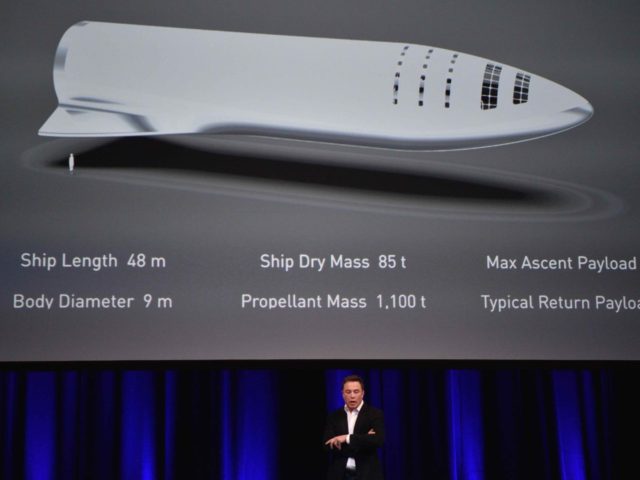CEO Elon Musk announced Friday that SpaceX is going all-in for interplanetary commuting to Mars by developing its next-generation rocket, called BFR (short for Big F***king Rocket).
Breitbart News recently reported that the ability of SpaceX to reliably launch, recover and reuse its Falcon 9 fist-stage booster rockets had radically disrupted the market for satellite launches, servicing the International Space Station, and lunching commercial development of space. SpaceX President Gwynne Shotwell estimates that after $1 million in refueling and $3 million in refurbishment, the company’s reusable booster has slashed the standard space launch price from $60 million to $40 million — a one-third savings.
Musk has stated that SpaceX’s future is the BFR, which can lift 660,000 lbs. of cargo into space, or about 12 times as much as the Falcon 9. SpaceX has a Falcon 9 Heavy version ready to fly next year that can lift twice its current payload. But Musk stated that the company will go all-in to fund BFR’s $10 billion estimated cost.
SpaceX’s CEO believes that the company can internally fund the project by increasing its launch frequency, which is up to 13 launches so dar in the first 9 months of the year, versus 8 for all of 2016. SpaceX has the NASA contract to service the International Space Station and launch dozens of commercial satellites, and is performing classified U.S. military launches.
SpaceX’s only real competitor is NASA’s own Space Launch System (SLS), which received funding in 2010 from the Obama Administration as part of the cancelling the Constellation back-to-the-moon program in 2010. NASA expects that by 2023, SLS will be able to lift 290,000 lbs. of cargo into space, about 6 times SpaceX’s Falcon 9.
NASA subcontracted work to Boeing, Lockheed, Orbital ATK, and Aerojet Rocketdyne, but the expected launch cost per non-reusable rocket is a ludicrous $1 billion. That is also before the inevitable government-managed time and cost overrun disasters.
Although the International Space Station has welcomed 200 visitors from 18 countries and hosted 1,900 scientific investigations from researchers in 95 countries since 2001, virtually none of the experiments there were oriented to make space a business platform.
But CB Insights reports that private venture capitalists see big profit opportunities, and their space-oriented investing spiked by 2,052 percent in 2015 to $2.3 billion on 44 deals. With another 40 deals raising $1.5 billion last year, CB’s database has identified 57 space tech startups organized in the three categories of launch, exploration, and downstream technologies.
The really big-bucks bets by VCs are in rockets and space planes, such as Musk’s SpaceX, Jeff Bozos’ Blue Origin, and Richard Branson’s Virgin Galactic. But other deals include Planetary Resources receiving $50 million for robotic asteroid mining, and SpaceVR raising $1.25 million on Kickstarter to launch micro-satellites into orbit that will allow consumers to experience space via virtual reality.

COMMENTS
Please let us know if you're having issues with commenting.